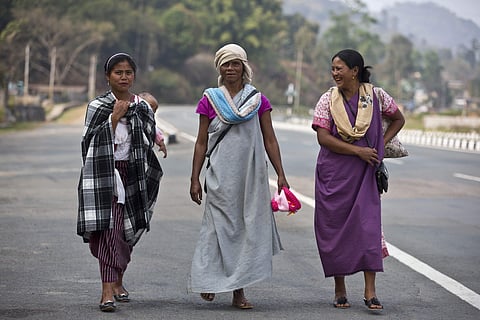

GUWAHATI: Meghalaya Governor Ganga Prasad has not given his assent to the controversial Khasi Hills Autonomous District (Khasi Social Custom of Lineage) (Second Amendment) Bill, 2018, passed by the Khasi Hills Autonomous District Council (KHADC) last month. Instead, he returned it to the state's District Council Affairs Department for further examination.
According to reports, the state government would consult legal experts before sending the Bill to the Governor for his nod. The Bill seeks to deprive a Khasi (tribe) woman of her scheduled tribe (ST) status and other privileges if she marries a non-Khasi. Also, the woman's children will be viewed as non-Khasis.
The Bill states: "Any Khasi woman, who marries a non-Khasi, as well as her offspring(s) born out of such marriage(s) shall be deemed as non-Khasi and lose the Khasi status and all the privileges and benefits as a member of the Khasi tribe who cannot claim preferential privileges under any law."
Justifying the Bill's approval, KHADC chief executive member HS Shylla said mixed marriages and inadequate laws posed a serious threat to the minority Khasi community.
However, women activists in the matrilineal state described the Bill as unconstitutional. They said they would challenge it if it gets the Governor's nod.
"If it so warrants, we will challenge the Bill (in a court). But the fact that the Governor has returned it means he has not given his assent. That they (Council) passed the Bill without consulting women or stakeholders was indicative of their patriarchal mindset. The Bill is like holding a sword over our women's neck. It is like a diktat," said activist Agnes Kharshiing, who is a leader of Shillong-based Civil Society Women's Organisation.
Legal experts say the Bill may not stand if challenged. They pointed out to a recent Supreme Court judgement that said choosing a life partner is a fundamental right of a person and as such, consent of a family or community is not necessary for marriage between two adults.
Congress approves two candidates for Meghalaya bypolls
After NRC, Assam’s neighbours Meghalaya and Nagaland raise infiltration firewall
Mentally-challenged girl raped repeatedly for two months in Meghalaya
North Eastern states should engage more with the ASEAN region: Meghalaya CM Conrad K Sangma